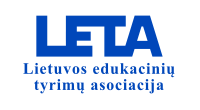Naudinga informacija

Valstybės kontrolė (2023). Mokymosi visą gyvenimą vertinimas
Nuorodos į MVG literatūros šaltinius
Kuzior, A., Krawczyk, D., Onopriienko, K., Petrushenko, Y., Onopriienko, I., & Onopriienko, V. (2023). Lifelong Learning as a Factor in the Country’s Competitiveness and Innovative Potential within the Framework of Sustainable Development. Sustainability, 15(13), 9968.
Olejnik, I. (2022). The concept of lifelong learning–managers’ expectations and youth attitudes. Zeszyty Naukowe Politechniki Śląskiej. Organizacja i Zarządzanie, (159).
Mejía-Manzano, L. A., Sirkis, G., Rojas, J. C., Gallardo, K., Vázquez-Villegas, P., Camacho-Zuñiga, C., … & Caratozzolo, P. (2022). Embracing thinking diversity in higher education to achieve a lifelong learning culture. Education sciences, 12(12), 913.
Rodero, L. G. (2023). THE EUROPEAN DIGITAL EDUCATION PLAN FOR THE DEVELOPMENT OF LIFELONG LEARNING. The value of the difference and lifelong learning in the contemporary pedagogy, 113.
Nguyen, A., Lämsä, J., Dwiarie, A., & Järvelä, S. (2024). Lifelong learner needs for human-centered self-regulated learning analytics. Information and Learning Sciences, 125(1/2), 68-108.
Delhez, P., Nautet, M., Saks, Y., & Zimmer, H. (2022). Lifelong learning for employees: investing in the future. NBB economic review, 1-14.
Nørgård, R. T. (2021). Theorising hybrid lifelong learning. British Journal of Educational Technology, 52(4), 1709-1723.
Eschenbacher, S., & Fleming, T. (2020). Transformative dimensions of lifelong learning: Mezirow, Rorty and COVID-19. International Review of Education, 66(5), 657-672.
Usui, T., Chikasada, M., & Aloiau, E. (2024). The characteristics of Japan’s “invisible people”. International Journal of Lifelong Education, 1-18.
Yang, C. (2019). The fourth industrial revolution, aging workers, older learners, and lifelong learning.
Hirju, I., & Georgescu, R. I. (2023). The concept of learning cities: Supporting lifelong learning through the use of smart tools. Smart Cities, 6(3), 1385-1397.
Bakker, W. (2023). The role of University Continuing Education in Europe. Three questions to Joost Korte. European Journal of University Lifelong.
Tam, M. (2016). The Confucian view of lifelong learning: Relevancy to the teaching and learning of older adults. Sociological and philosophical perspectives on education in the Asia-Pacific region, 193-204.
Holford, J., & Milana, M. (2023). The european union and lifelong learning policy. In Third International Handbook of Lifelong Learning (pp. 499-522). Cham: Springer International Publishing.
Korpi, T., & Tåhlin, M. (2021). On‐the‐job training: a skill match approach to the determinants of lifelong learning. Industrial Relations Journal, 52(1), 64-81.
Leyretana, K., & Trinidad, J. E. (2022). Predicting or preventing lifelong learning? The role of employment, time, cost, and prior achievement. Journal of Adult and Continuing Education, 28(2), 658-673.
Kupiec, K. (2024). What American children’s museum mission statements say about Lifelong Competencies. Curator: The Museum Journal.
Abukari, A. (2005). Conceptualising lifelong learning: a reflection on lifelong learning at Lund University (Sweden) and Middlesex University (UK). European Journal of Education, 40(2), 143-154.
Arifin, A., Suryaningsih, S. S., & Arifudin, O. (2024). The Relationship Between Classroom Environment, Teacher Professional Development, and Student Academic Performance in Secondary Education. International Education Trend Issues, 2(2), 151-159.
